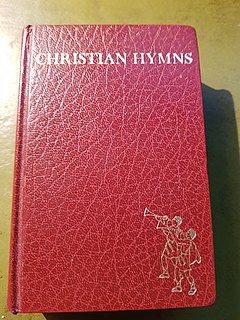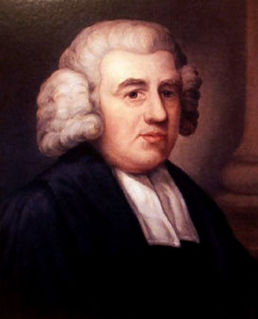Related Research Articles

A hymnal or hymnary is a collection of hymns, usually in the form of a book, called a hymnbook. Hymnals are used in congregational singing. A hymnal may contain only hymn texts ; written melodies are extra, and more recently harmony parts have also been provided.
Decisions concerning the conduct of public worship in the Church of Scotland are entirely at the discretion of the parish minister. As a result, a wide variety of musical resources are used. However, at various times in its history, the General Assembly has commissioned volumes of psalms and hymns for use by congregations.
The Trinity Hymnal is a Christian hymnal written and compiled both by and for those from a Presbyterian background. It has been released in two editions and is published by Great Commission Publications, a joint project between the Orthodox Presbyterian Church and the Presbyterian Church in America.
Hymns are an important part of the history and worship of The Church of Jesus Christ of Latter-day Saints.

Hymns of The Church of Jesus Christ of Latter-day Saints is the official hymnal of The Church of Jesus Christ of Latter-day Saints . Published in English in 1985, and later in many other languages, it is used throughout the LDS Church. This article refers to the English version. The book was published on the 150th anniversary of the publication of the first LDS hymnbook, compiled by Emma Smith in 1835. Previous hymnbooks used by the church include The Manchester Hymnal (1840), The Psalmody (1889), Songs of Zion (1908), Hymns (1927), and Hymns (1948).

"Onward, Christian Soldiers" is a 19th-century English hymn. The words were written by Sabine Baring-Gould in 1865, and the music was composed by Arthur Sullivan in 1871. Sullivan named the tune "St Gertrude," after the wife of his friend Ernest Clay Ker Seymer, at whose country home he composed the tune. The Salvation Army adopted the hymn as its favoured processional. The piece became Sullivan's most popular hymn. The hymn's theme is taken from references in the New Testament to the Christian being a soldier for Christ, for example II Timothy 2:3 (KJV): "Thou therefore endure hardness, as a good soldier of Jesus Christ."
"For the Beauty of the Earth" is a Christian hymn by Folliott S. Pierpoint (1835-1917).

Christian Hymns is a non-denominational Christian hymnbook.

"Lord of all Hopefulness" is a Christian hymn written by English writer Jan Struther, which was published in the enlarged edition of Songs of Praise in 1931. The hymn is used in liturgy, at weddings and at the beginning of funeral services, and is one of the most popular hymns in the United Kingdom.
The Lutheran Hymnal with Supplement is the second official hymnal of the Lutheran Church of Australia, first published in its present form in 1989.
The Little Flock hymnbook is in common use amongst Exclusive Brethren in various editions which nevertheless derive from a common source. It exists in almost as many variations and editions as there are distinct groups of Exclusive Brethren.
The Evangelical Lutheran Hymn-Book was the first official English-language hymnal of the Lutheran Church–Missouri Synod, then called the Evangelical Lutheran Synod of Missouri, Ohio, and other States. It was published in 1912 by the synod's publishing house, Concordia Publishing House, in St. Louis, Missouri.
Singing the Faith is the current authorised hymnbook (hymnal) of the Methodist Church of Great Britain, first published in 2011.

"Holy God, We Praise Thy Name" is a Christian hymn.

"Glorious Things of Thee Are Spoken", also called "Zion, or the City of God", is an 18th-century English hymn written by John Newton, who also wrote the hymn "Amazing Grace". Shape note composer Alexander Johnson set it to his tune "Jefferson" in 1818, and as such it has remained in shape note collections such as the Sacred Harp ever since. However, the hymn is most often set to the tune of Joseph Haydn's "Gott erhalte Franz den Kaiser". In recent decades it has been sometimes replaced by "Abbot's Leigh". This was written for this text by The Reverend Cyril Vincent Taylor in 1942 while he was a producer of Religious Broadcasting at the BBC and stationed at the village of Abbots Leigh. Multiple other tunes have also been used with the hymn.
Edward Wilton Eddis was a poet and prophet in the Catholic Apostolic Church at Westminster, London and co-author of the Hymns for the Use of the Churches, the hymnal of the Catholic Apostolic Church.

Gotteslob is the title of the hymnbook authorized by the Catholic dioceses in Germany, Austria, South Tyrol, Luxembourg and Liège, Belgium. First published in Advent 2013, it is the current official hymnal for German-speaking Catholics, succeeding the first common German hymnal, the 1975 edition of the same name. Each diocese published a book containing a common section and a regional section. The first editions amounted to around 4 million copies.

"Lo! He comes with clouds descending" is a hymn with a text by John Cennick (1718–1755) and Charles Wesley (1707–1788). Most commonly sung at Advent, the hymn derives its theological content from the Book of Revelation relating imagery of the Day of Judgment. Considered one of the "Great Four Anglican Hymns" in the 19th century, it is most commonly sung to the tune Helmsley, first published in 1763.
Hymnody in continental Europe developed from early liturgical music, especially Gregorian chant. Music became more complicated as embellishments and variations were added, along with influences from secular music. Although vernacular leisen and vernacular or mixed-language Carol (music) were sung in the Middle Ages, more vernacular hymnody emerged during the Protestant Reformation, although ecclesiastical Latin continued to be used after the Reformation. Since then, developments have shifted between isorhythmic, homorhythmic, and more rounded musical forms with some lilting. Theological underpinnings influenced the narrative point of view used, with Pietism especially encouraging the use of the first person singular. In the last several centuries, many songs from Evangelicalism have been translated from English into German.
References
- ↑ The Westminster Hymnal, (London: R & T Washbourne, Ltd., 1912)